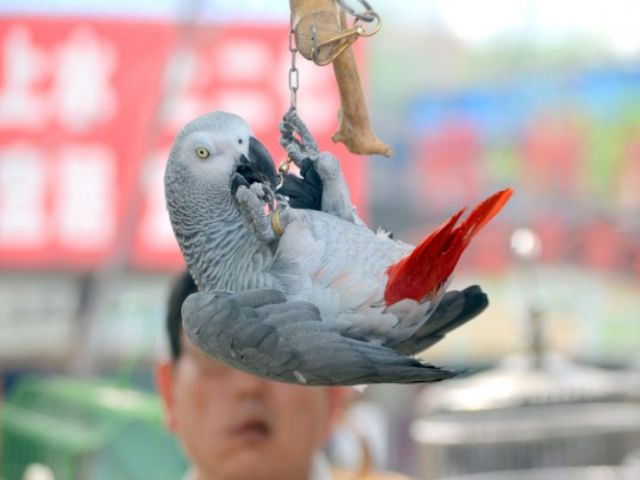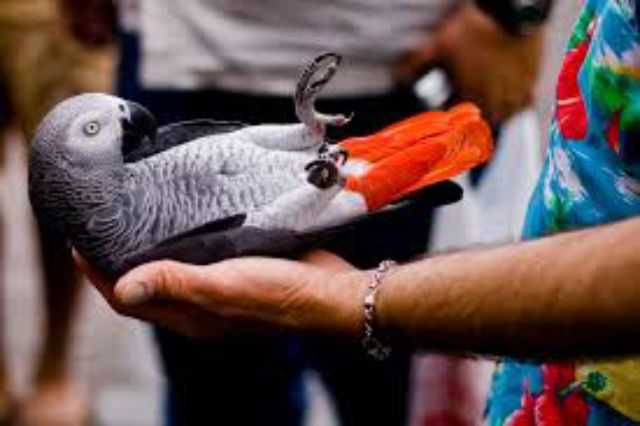You’ve researched and decided an African Grey parrot is suitable for your family. Maybe you’re anxiously waiting to bring your new baby home.
Or maybe you already have a grey and want to ensure you do everything right, so he becomes the rewarding companion you’ve always wanted.
Either way, whether you’re the proud owner of a bouncing baby grey or an older grey who’s maybe not so bouncy but is still a good bird, please read on. I will tell you what to do to help your grey stay friendly, confident, and happy. Nature made the African grey parrot one of the smartest animals in the world. You can make him a friend.
Expose Parrots to New Toys While They’re Young
Young greys need to be exposed to new situations in a way that doesn’t make them afraid but instead makes them confident and adaptable. Even when they’re very young, they’re constantly taking in what’s going on around them. Then, as they learn that what’s out there isn’t dangerous, they can relax and enjoy exploring.

You’ll want to provide your baby with various age-appropriate toys and foods and have different people hold and talk to him when possible. They say by the time a puppy is four months old, he should meet 100 people. Of course, it would be great if your parrot could do that, but it is impractical. So instead of having your grey meet 100 different people, show him 100 other toys and objects around the house.
Take it slowly if you need to, but know that by experiencing so much when he’s young, new stuff isn’t as likely to freak him out when he’s older. There will be situations he won’t like, and no bird will be 100% confident all the time, but you’ll go a long way towards preventing the “phobic” grey you’ve heard about.
Phobic greys are often birds that were raised without much interaction or environmental stimulation. It doesn’t necessarily mean something bad happened to them to make them afraid. It might mean nothing much happened to them at all.
So one of the keys to having a laid-back, take-it-all-in-stride grey is to help him explore, play and discover in a safe, nurturing setting. Even if your bird isn’t a baby, you can start introducing more variety into his life. It’s never too late for him to learn.
Teaching your grey about the world can be fun. Many people choose parrots as pets in the first place because parrots usually are entertaining. Intelligence is often given as a reason people choose an African grey. You may have encountered people bragging about how bright their greys are, and scientific research also backs this up. Parrots are smart, and the grey is one of the smartest, with an intelligence level similar to a 5-year-old child.
If you’ve ever been around a 2-year-old, then you know how easily they get bored, and a bored kid is often an unhappy, frustrated, and whiny kid. A grey parrot is just like that, but not graduating and going off to college for him. Instead, he’s going to rely on you to entertain him forever.
Boredom may be the number one enemy of companion African greys. They can become unhappy and frustrated when they don’t have something to occupy themselves with. Maybe not whiny, though. Instead, they may pick their feathers. How can you keep your grey from getting bored? One way is by providing the right toys.
Keep Them Companions
Another is through spending time with him. Petting and just hanging out are great, but you can do other activities like teaching him tricks and games. This gives him something to think about. Another activity that will keep him busy is the opportunity to forage for food.
In the wild, parrots spend a lot of time looking for things to eat, but in our homes, we lay it out right there for them. Encourage your grey natural foraging instincts by hiding food in his cage and by using treat holders and rod feeders.
Some grey owners worry that if their bird spends a lot of time alone, it may need a companion bird. Another parrot is an option, but there are other ways to keep a grey from feeling lonely and bored when you’re not there. Set your television and radio on timers to turn on and off at various times.

Put your bird’s cage near a window and provide an outdoor bird feeding station where he can see it (although not all parrots like being by windows, so use caution here). You could even set up a simple fish tank. If the idea of more pets isn’t for you, a “lava lamp” or other objects with moving features can be attractive.
Spending time with you will probably always be his favorite thing to do, but providing something to look at and listen to when you’re gone will make your grey day more enjoyable.
Another responsibility you have is to establish limits and rules, just as you would for a child. Maybe you need to establish basic shoulder rules for your bird, as always say “shoulder perching by invitation only” in other words, the bird is only allowed on our shoulder if we PLACE him/her there. This keeps it so that the bird respects being allowed up there and doesn’t EXPECT it and then refuses to come down later.
You may think that as a baby, he can do no wrong or be tempted to let him get away with naughty behavior because you want him to like you. However, providing structure with your grey when he’s young will help you manage if he does go through a stubborn period once in a while.
Proper socialization, environmental enrichment, and guidance don’t mean you will never have any struggles with an African grey, but if the right upbringing doesn’t happen, the chance of behavior problems increases greatly.
According to parrot behavior experts, a majority of the greys who become feather pickers, cage-bound, aggressive, or phobic (all common African grey behavior problems) come from less-than-ideal backgrounds. Troubled greys become a challenge for their owners, and the birds may end up being passed from home to home. Eventually, someone knowledgeable may step in and help, but so many problems could have been prevented if the right care had occurred in the first place.
So please realize that your greys education began when he was very young, maybe even before his eyes were open. From the moment his hand feeder first held him and coaxed him to eat his formula, he was being exposed to a very different world compared to that of a wild African grey. As he grew, his hand feeder guided him and showed him how to trust people and look to us for food, and hopefully, comfort and companionship.
Now that he’s with you, you’ll help him continue his journey as he learns about his new world—your home. His instincts tell him to be cautious of new things, but his baby parrot’s curiosity and trust in you will allow him to explore and learn more daily. You’ve got a very important job ahead of you, and your grey is counting on you to do it well.
